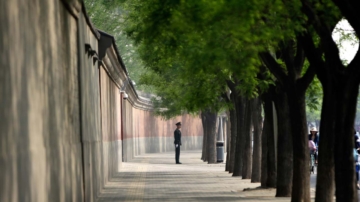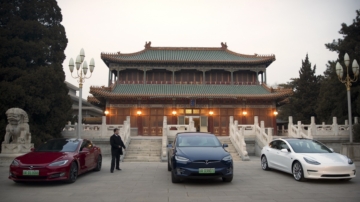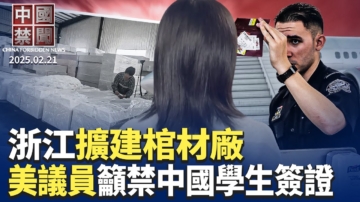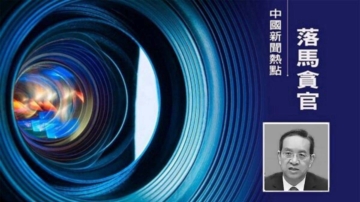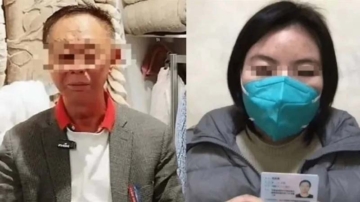【新唐人2013年01月23日訊】中共貪官、淫官遍地,一直為民間所詬病,中共舉行「十八大」後,在新領導班子的高調「反腐」下,引爆了民間反腐浪潮,一些民眾聘用私家偵探收集貪官罪證。最近,中共以非法獲取及買賣個人資料等罪名,大舉取締各地私家偵探社,目前已有2500多名私家偵探被抓捕。評論分析,中共大舉抓捕這麼多私家偵探,實質是一場保護貪官隱私的政治運動。
近年來,被查處的中共貪官95%有情婦,甚至出現多個貪官共用情婦現象。中共「十八大」後,被舉報的淫官數量直線攀升,網路上最近曝光了一些被偷拍的官員淫亂視頻和淫照。
上個月,山東男子齊紅向大陸媒體說,中共不少官員的汽車、辦公室或是臥房,都被裝了偷聽器材,他曾受聘為上百名官員拆除了300多個偷聽器材。
1月19號,中共媒體報導說,公安部為保護網路隱私權,自14號起,統一部署抓捕非法私家偵探行動,公安部指揮北京、河北、上海、浙江、廣東、湖北等21個省區市公安機關統一行動,共抓獲犯罪嫌疑人1152名。
北京時政觀察人士華頗指出,中共這次大舉抓捕私家偵探,旗號是保護公民的隱私權,實質上是為了保護大批官員的隱私權。
北京時政觀察人士華頗:「中共官員的財產到現在還不公開,一直是暗箱操作,作為主人的人民一直不知道這些僕人們有多少財產,這很荒唐的,貪官們有多少情婦,有多少財產,變成他們個人的隱私,這也非常的荒唐,所以我說這個所謂保護,所謂的隱私權,已經變成官員貪腐的一個遮羞布。」
時政評論員汪北稷:「中共就是非法竊取中國的權力、政權,也非法竊取社會各方面的資訊和資料,所以中共就把社會上民間可以承載的監督力量----私家偵探取締了以後,來讓它自己壟斷這種偵查的權力,調查的權力,反貪的行為,來達到它政治上為所慾為的目地。」
20號,「中國人權民運信息中心」引述消息透露,中共「十八大」決議嚴厲反腐後,不少具經濟能力的民眾聘用私家偵探,蒐集貪官證據,再實名揭發,使得這股民間反腐風潮愈演愈烈。自14號起,中共當局突然對私家偵探進行大規模抓捕,截至19號,已有多達2500名私家偵探被捕。
報導說,被捕的私家偵探主要是受民間人士委託,調查涉貪官員,所用的手段絕對屬於合法調查,包括通過公開的商業登記資料,查找涉貪官員名下的資產,以及監視官員與情婦會面等。
北京憲政學者陳永苗指出,當局一直在喊「反腐敗」,並說反腐敗要走群眾路線,這些偵探走的就是群眾路線的反腐敗,但是它卻不允許。
北京憲政學者陳永苗:「它抓了幾千號人,就像三反、五反一樣,它是一場政治運動,肯定是為了解決政治問題,它不是一個法律問題,這些幾千人,我相信有些人肯定會涉黑了,或者幹甚麼了,但是整體的抓了這麼多人,肯定是一場政治運動。」
陳永苗指出,這些私家偵探破壞中共的組織性和官僚體系。
陳永苗:「它把(反)腐敗當做一種表演,一種做秀,然後做給老百姓看,如果讓偵探直接鑽進來,如果再加上網路媒體,跟微博聯合起來的話,鬼知道市委書記在今年會不會被幹掉,它充滿了不確定,而且是一個巨大的炸彈,隨時都可能炸了。」
時政評論員汪北稷指出,中共當局的執法機構不透明、不公正、不廉潔、不為人民辦事,而民間商業行為的私家偵探得不到一個公正的對待,這種亂彈琴的做法,只會加速它的解體和滅亡。
採訪編輯/李韻 後製/王明宇
Massive Arrest of 2,500 Private Detectives in China
For many years, corruption and adultery among Chinese
Communist Party (CCP) officials has been commonplace.
This has been the focus of public criticism in China.
Since November 2012, the new CCP leadership has
raised the profile of advocating the combat of corruption.
The situation has inspired waves of civil anti-corruption, and
lots of private detectives have been hired to probe corruption.
Recently, a private detective business was outlawed, and
accused of illegally acquiring and trading personal data.
So far, 2,500 private detectives have been arrested.
Commentators says that the real intention
is to protect those corrupt CCP officials.
Within the ranks of recently punished CCP officials,
95% had mistresses and even shared mistresses.
After the 18th Party Congress, the number of officials
being denounced after scandals has risen linearly.
Recently, netizens exposed sex scandal
videos and photos involving officials.
In December 2012, media reported that lots
of tapping devices have been installed in the
cars, offices or bedrooms of CCP officials.
Shandong citizen Qi Hong told the media
that he had been hired to remove over 300
wire-tappings from more than 100 officials.
On January 19, official CCP state media reported on an
official police action in the protection of online privacy.
It said the Public Security Ministry launched a nationwide
arrest of 'illegal' private detectives on January 14.
This action covered 21 regions, including Beijing,
Hebei, Shanghai, Zhejiang, Guangdong, and Hubei.
Reportedly, the police arrested
a total of 1,152 criminal suspects.
Hua Po, political observer in Beijing, comments on the issue.
He says the official action was staged in the name
of protecting citizens privacy, but its real goal was
to protect the privacy of a large number of officials.
Hua Po: “To this day, CCP officials have not yet declared
their personal assets, and all were operated in the dark.
It's ridiculous that the people, who should be the
watchdogs of a government, have not known how
much property these 'servants' have possessed.
All this was done in private.
This included their number of mistresses and
their financial assets, which are really absurd.
So the alleged rights to privacy have been used
as a fig leaf to cover up the corruption of officials.”
Critic Wang Beiji: “The CCP has illegally taken over
China, and also steals information in various fields.
By outlawing private investigators, a civil society watchdog,
the Party can monopolize such anti-corruption investigations.
It can do whatever it wants.”
On January 20, the Information Center for Human
Rights & Democracy cited informed sources.
It said that the 18th Party Congress' claims of staging
a fierce fight against corruption inspired many rich people.
They hired private detectives to collect
evidence of corruption to be exposed.
This has fueled civil combat against corrupt officials.
However, on January 14, the authorities took large-scale
actions, arresting 2,500 private detectives on January 19.
Media reported the majority of arrested private detectives
were hired non-governmentally to investigate corrupt officials.
Reportedly, the approaches they've taken are all lawful.
These include getting information from public data,
locating assets under the names of corrupt officials,
and monitoring officials meeting with their mistresses.
Beijing constitutional scholar Chen Yongmiao, indicates
that the regime has touted “anti-corruption” for years.
It also claimed that it combats
corruption by following a strict line.
What these detectives have done is exactly what has
been touted, but has now become unlawful, says Chen.
Chen Yongmiao: “Thousands of people have been arrested.
This is a political movement, like many others in CCP history.
It was definitely done to solve some
political problems, not legal problems.
I think some of those arrested may have been
involved in the Mafia, or worked underground.
But broadly, the arrest of so many
people is definitely a political movement.”
Chen Yongmiao remarks that these private
detectives have threatened the CCP's
organizational structure and bureaucratic system.
Chen Yongmiao: "The regime now uses the drive
of anti-corruption as a show performed to the public.
If it allows private detectives to become involved,
combined with the effect of online media such
as micro-blogging, anything could happen,
at any time to those corrupt CCP officials.
Uncertainty pervades everywhere like a huge
time bomb, which may explode at anytime.”
Critic Wang Beiji says that the CCP regime's law
enforcement agencies are non-transparent, unfair,
corruptible and have failed in serving the people.
It has treated the private detective business very unfairly.
Wang remarks that these actions will only accelerate
the Communist regime's disintegration, and its demise.
近年來,被查處的中共貪官95%有情婦,甚至出現多個貪官共用情婦現象。中共「十八大」後,被舉報的淫官數量直線攀升,網路上最近曝光了一些被偷拍的官員淫亂視頻和淫照。
上個月,山東男子齊紅向大陸媒體說,中共不少官員的汽車、辦公室或是臥房,都被裝了偷聽器材,他曾受聘為上百名官員拆除了300多個偷聽器材。
1月19號,中共媒體報導說,公安部為保護網路隱私權,自14號起,統一部署抓捕非法私家偵探行動,公安部指揮北京、河北、上海、浙江、廣東、湖北等21個省區市公安機關統一行動,共抓獲犯罪嫌疑人1152名。
北京時政觀察人士華頗指出,中共這次大舉抓捕私家偵探,旗號是保護公民的隱私權,實質上是為了保護大批官員的隱私權。
北京時政觀察人士華頗:「中共官員的財產到現在還不公開,一直是暗箱操作,作為主人的人民一直不知道這些僕人們有多少財產,這很荒唐的,貪官們有多少情婦,有多少財產,變成他們個人的隱私,這也非常的荒唐,所以我說這個所謂保護,所謂的隱私權,已經變成官員貪腐的一個遮羞布。」
時政評論員汪北稷:「中共就是非法竊取中國的權力、政權,也非法竊取社會各方面的資訊和資料,所以中共就把社會上民間可以承載的監督力量----私家偵探取締了以後,來讓它自己壟斷這種偵查的權力,調查的權力,反貪的行為,來達到它政治上為所慾為的目地。」
20號,「中國人權民運信息中心」引述消息透露,中共「十八大」決議嚴厲反腐後,不少具經濟能力的民眾聘用私家偵探,蒐集貪官證據,再實名揭發,使得這股民間反腐風潮愈演愈烈。自14號起,中共當局突然對私家偵探進行大規模抓捕,截至19號,已有多達2500名私家偵探被捕。
報導說,被捕的私家偵探主要是受民間人士委託,調查涉貪官員,所用的手段絕對屬於合法調查,包括通過公開的商業登記資料,查找涉貪官員名下的資產,以及監視官員與情婦會面等。
北京憲政學者陳永苗指出,當局一直在喊「反腐敗」,並說反腐敗要走群眾路線,這些偵探走的就是群眾路線的反腐敗,但是它卻不允許。
北京憲政學者陳永苗:「它抓了幾千號人,就像三反、五反一樣,它是一場政治運動,肯定是為了解決政治問題,它不是一個法律問題,這些幾千人,我相信有些人肯定會涉黑了,或者幹甚麼了,但是整體的抓了這麼多人,肯定是一場政治運動。」
陳永苗指出,這些私家偵探破壞中共的組織性和官僚體系。
陳永苗:「它把(反)腐敗當做一種表演,一種做秀,然後做給老百姓看,如果讓偵探直接鑽進來,如果再加上網路媒體,跟微博聯合起來的話,鬼知道市委書記在今年會不會被幹掉,它充滿了不確定,而且是一個巨大的炸彈,隨時都可能炸了。」
時政評論員汪北稷指出,中共當局的執法機構不透明、不公正、不廉潔、不為人民辦事,而民間商業行為的私家偵探得不到一個公正的對待,這種亂彈琴的做法,只會加速它的解體和滅亡。
採訪編輯/李韻 後製/王明宇
Massive Arrest of 2,500 Private Detectives in China
For many years, corruption and adultery among Chinese
Communist Party (CCP) officials has been commonplace.
This has been the focus of public criticism in China.
Since November 2012, the new CCP leadership has
raised the profile of advocating the combat of corruption.
The situation has inspired waves of civil anti-corruption, and
lots of private detectives have been hired to probe corruption.
Recently, a private detective business was outlawed, and
accused of illegally acquiring and trading personal data.
So far, 2,500 private detectives have been arrested.
Commentators says that the real intention
is to protect those corrupt CCP officials.
Within the ranks of recently punished CCP officials,
95% had mistresses and even shared mistresses.
After the 18th Party Congress, the number of officials
being denounced after scandals has risen linearly.
Recently, netizens exposed sex scandal
videos and photos involving officials.
In December 2012, media reported that lots
of tapping devices have been installed in the
cars, offices or bedrooms of CCP officials.
Shandong citizen Qi Hong told the media
that he had been hired to remove over 300
wire-tappings from more than 100 officials.
On January 19, official CCP state media reported on an
official police action in the protection of online privacy.
It said the Public Security Ministry launched a nationwide
arrest of 'illegal' private detectives on January 14.
This action covered 21 regions, including Beijing,
Hebei, Shanghai, Zhejiang, Guangdong, and Hubei.
Reportedly, the police arrested
a total of 1,152 criminal suspects.
Hua Po, political observer in Beijing, comments on the issue.
He says the official action was staged in the name
of protecting citizens privacy, but its real goal was
to protect the privacy of a large number of officials.
Hua Po: “To this day, CCP officials have not yet declared
their personal assets, and all were operated in the dark.
It's ridiculous that the people, who should be the
watchdogs of a government, have not known how
much property these 'servants' have possessed.
All this was done in private.
This included their number of mistresses and
their financial assets, which are really absurd.
So the alleged rights to privacy have been used
as a fig leaf to cover up the corruption of officials.”
Critic Wang Beiji: “The CCP has illegally taken over
China, and also steals information in various fields.
By outlawing private investigators, a civil society watchdog,
the Party can monopolize such anti-corruption investigations.
It can do whatever it wants.”
On January 20, the Information Center for Human
Rights & Democracy cited informed sources.
It said that the 18th Party Congress' claims of staging
a fierce fight against corruption inspired many rich people.
They hired private detectives to collect
evidence of corruption to be exposed.
This has fueled civil combat against corrupt officials.
However, on January 14, the authorities took large-scale
actions, arresting 2,500 private detectives on January 19.
Media reported the majority of arrested private detectives
were hired non-governmentally to investigate corrupt officials.
Reportedly, the approaches they've taken are all lawful.
These include getting information from public data,
locating assets under the names of corrupt officials,
and monitoring officials meeting with their mistresses.
Beijing constitutional scholar Chen Yongmiao, indicates
that the regime has touted “anti-corruption” for years.
It also claimed that it combats
corruption by following a strict line.
What these detectives have done is exactly what has
been touted, but has now become unlawful, says Chen.
Chen Yongmiao: “Thousands of people have been arrested.
This is a political movement, like many others in CCP history.
It was definitely done to solve some
political problems, not legal problems.
I think some of those arrested may have been
involved in the Mafia, or worked underground.
But broadly, the arrest of so many
people is definitely a political movement.”
Chen Yongmiao remarks that these private
detectives have threatened the CCP's
organizational structure and bureaucratic system.
Chen Yongmiao: "The regime now uses the drive
of anti-corruption as a show performed to the public.
If it allows private detectives to become involved,
combined with the effect of online media such
as micro-blogging, anything could happen,
at any time to those corrupt CCP officials.
Uncertainty pervades everywhere like a huge
time bomb, which may explode at anytime.”
Critic Wang Beiji says that the CCP regime's law
enforcement agencies are non-transparent, unfair,
corruptible and have failed in serving the people.
It has treated the private detective business very unfairly.
Wang remarks that these actions will only accelerate
the Communist regime's disintegration, and its demise.

